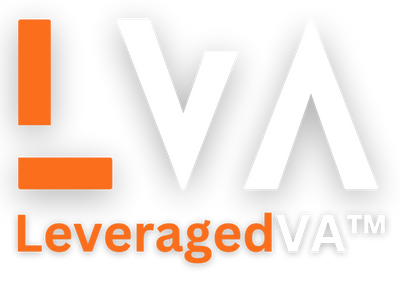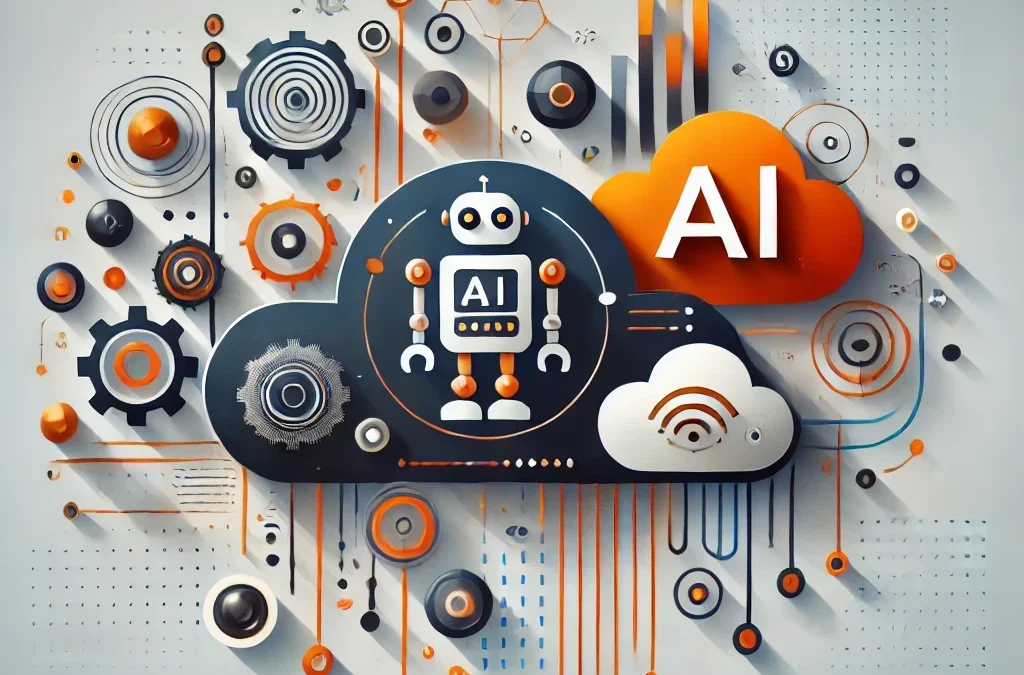
by Phill Tomlinson | Feb 10, 2025 | AI
AI agents are advancing at a breathtaking pace, reshaping industries—including commercial real estate (CRE). This evolution has profound implications for how CRE professionals manage workflows, analyze data, and interact with clients. From text-based automation to predictive AI, these advancements are streamlining processes, optimizing efficiency, and unlocking new opportunities in the industry.
Phase 1: Text-Based AI Agents in CRE
The journey began with text-based AI agents, where brokers and investors could leverage AI-powered platforms to generate property descriptions, draft contracts, and automate emails. Tools like ChatGPT and CRM-integrated AI assistants have made it easier to respond to client inquiries, conduct market analysis, and handle administrative tasks.
For CRE professionals, text-based AI has been a game-changer in saving time and reducing the effort spent on repetitive documentation. By simply inputting natural language prompts, brokers can generate reports, financial summaries, and even property marketing materials in seconds.
Phase 2: Voice-Based AI Agents in CRE
The next step in AI evolution introduced voice-based AI agents, enabling hands-free interactions with technology. Virtual assistants like Siri, Google Assistant, and voice-integrated CRM systems allow brokers to dictate notes, schedule property showings, and retrieve market data using simple voice commands.
In an industry where brokers are often on the go—conducting site visits, attending meetings, and negotiating deals—voice AI reduces the need to stop and type, making business operations more fluid. Imagine asking an AI, “What are the latest comps in this neighborhood?” and receiving an instant market analysis, all while driving to a property showing.
Phase 3: Brain-Computer Interfaces and CRE Decision-Making
While still in development, brain-computer interfaces (BCIs) hold the potential to further revolutionize CRE decision-making. BCIs would enable brokers and investors to interact with AI simply by thinking, removing the need for physical inputs.
In the future, BCIs could allow for real-time analysis of investment opportunities, instant portfolio adjustments, and even mental commands to generate contracts or proposals. This phase of AI interaction will redefine efficiency, providing instant access to market insights without breaking focus on negotiations or client meetings.
Phase 4: Predictive AI Agents in CRE
Perhaps the most exciting advancement in AI technology for CRE is predictive AI agents. These systems analyze behavioral patterns, market trends, and economic indicators to anticipate future real estate needs. Instead of reacting to market shifts, brokers and investors can stay ahead with AI-driven insights.
Predictive AI in CRE will:
- Identify Investment Opportunities: AI can scan vast amounts of market data to highlight properties with high growth potential before they hit the market.
- Optimize Deal Flow: By analyzing client preferences and deal history, AI agents can suggest the best opportunities for investors, reducing time spent on research.
- Automate Lead Follow-Ups: AI will proactively engage with prospects, schedule meetings, and even send personalized updates based on buyer interest.
- Enhance Property Management: AI-driven automation will anticipate maintenance needs, tenant behaviors, and optimal lease structuring for maximum profitability.
Conclusion: AI’s Role in the Future of CRE
As AI agents evolve from text-based assistants to predictive systems, their role in the CRE industry will continue to expand. From handling administrative work to making strategic investment decisions, AI is shifting the way brokers, investors, and property managers operate.
The future of AI in commercial real estate is not just about efficiency—it’s about transformation. AI will empower professionals to make data-driven decisions faster, automate critical processes, and create a more seamless experience for clients. Those who embrace AI’s evolution will stay ahead in an increasingly competitive and technology-driven market.
Our teams, both LeveragedCRE and LeveragedVA, effectively leverage AI daily to optimize multiple tasks, enhancing productivity and efficiency. We’ve currently integrated 8 different AI automations into our weekly workflow, to streamline our operations. Taking it a step further, we’re in the process of developing an innovative 20-Agent Voice-Based AI System, that will be designed to help our team and Virtual Assistants save an additional 20–30 hours per week.
If you’re curious about how this works and want to explore how these tools can benefit your business, we’d love to connect with you! Click here to schedule a quick discovery call or visit our website at LeveragedVA.com for more details.

by Phill Tomlinson | Feb 4, 2025 | AI
The rise of AI agents is set to redefine the landscape of commercial real estate (CRE), transforming how brokers manage deals, communicate with clients, and handle daily operations. As AI technology integrates seamlessly into business processes, CRE brokers will gain powerful tools to enhance efficiency, streamline transactions, and improve client interactions in ways previously unimaginable.
The New Technology Ecosystem for CRE Brokers
The days of being tied to emails, spreadsheets, and endless follow-ups are numbered. AI-driven assistants, smart CRM integrations, and real-time data insights will soon take center stage, allowing brokers to focus more on closing deals rather than managing administrative burdens.
For instance, AI-powered virtual assistants could:
- Qualify Leads Instantly – AI agents can analyze inquiries, identify motivated buyers or tenants, and prioritize leads based on intent.
- Automate Follow-Ups – Instead of manually tracking conversations, AI can send timely responses, schedule meetings, and nurture leads on autopilot.
- Market Listings Efficiently – AI tools can craft compelling property descriptions, generate targeted ads, and distribute listings across multiple platforms with minimal effort.
- Provide Real-Time Insights – Imagine having an AI assistant that continuously monitors market trends, property values, and investment opportunities, delivering insights that keep you ahead of the competition.
The Evolution of AI Assistants in CRE
AI in commercial real estate is moving beyond chatbots and simple automation—it’s evolving into an indispensable business partner. Picture an AI assistant that operates across your entire tech ecosystem, seamlessly handling:
- Deal Coordination – Tracking contracts, managing due diligence, and ensuring compliance without brokers having to micromanage every step.
- Client Relationship Management – Personalizing communication by remembering past interactions, client preferences, and follow-up needs.
- Transaction Support – AI agents can draft emails, schedule site visits, and even analyze lease terms to flag potential risks or opportunities.
This AI-powered assistant won’t just react to your requests—it will anticipate your needs, proactively suggesting the best next steps based on client engagement, market activity, and deal status.
A More Efficient, Human-Centric CRE Industry
With AI handling complex backend tasks, brokers can shift from being overwhelmed with admin work to spending more time in high-value, relationship-building activities. Imagine walking into a client meeting, and your AI assistant has already:
- Compiled a property valuation report based on the latest comps.
- Summarized key deal points from previous conversations.
- Identified potential objections based on market data and client history.
This shift will make brokers more effective, allowing them to focus on closing deals and fostering long-term client relationships rather than getting buried in repetitive tasks.
The Future: Smarter Brokers, Not Just Smarter Tech
AI-powered personal technology is on track to become the ultimate tool for CRE brokers—intelligent, intuitive, and practically invisible in its execution. These AI agents will simplify operations, reduce administrative friction, and help brokers close more deals with less effort.
The future isn’t just about better technology; it’s about brokers operating at their highest potential. With AI as a trusted ally, CRE professionals can elevate their business, gain a competitive edge, and focus on what truly matters—building relationships and driving success in the industry.
Our Commercial Real Estate (CRE) team leverages AI daily to optimize multiple tasks, enhancing productivity and efficiency. Currently, we’ve integrated 8 powerful AI automations, used weekly, to streamline our operations. Taking it a step further, we’re in the process of developing an innovative 20-Agent AI System, designed to help our team and Virtual Assistants save an additional 20–30 hours per week.
If you’re curious about how this works and want to explore how these tools can benefit your business, we’d love to connect! Click here to schedule a quick discovery call or visit our website at LeveragedVA.com for more details.

by Phill Tomlinson | Jan 31, 2025 | AI
The AI revolution is reshaping industries across the globe, and commercial real estate (CRE) is no exception. For brokers, this transformation presents immense opportunities to streamline operations, improve client experiences, and stay ahead in a competitive market. However, adapting to these changes requires strategic preparation and a proactive mindset.
The Need to Adapt AI for CRE Brokers
The CRE industry is evolving rapidly as AI tools and automation redefine traditional workflows. From data analysis and property marketing to client engagement, AI is revolutionizing how brokers operate. Those who embrace these changes will thrive, while others risk falling behind.
Adaptation is no longer optional—it’s essential. Brokers must develop skills to leverage AI tools effectively, position themselves as leaders in the AI-powered landscape, and align their strategies with technological advancements.
Strategies for CRE Brokers to Succeed in the AI Revolution
- Master AI Tools:
Familiarize yourself with AI-driven platforms for tasks like market research, CRM automation, and property marketing. By becoming an expert in these tools, you can streamline operations and deliver better results for your clients.
- Transform Your Business into an AI-First Model:
Incorporate AI agents into your workflows to optimize efficiency. For example:
- Use predictive analytics to identify emerging market opportunities.
- Automate repetitive tasks like generating reports or scheduling meetings.
- Enhance client communication with AI-powered chatbots and email systems.
- Focus on Creativity and Leadership:
AI excels at handling routine tasks, but it cannot replace human creativity, empathy, or strategic thinking. Focus on building relationships, crafting personalized client strategies, and leading your team to adopt innovative approaches.
- Stay Ahead with Education:
- Invest in training programs for yourself and your team to stay updated on the latest technologies.
- Attend industry conferences and webinars on AI applications in CRE.
- Embrace Proactivity:
Act now to integrate AI into your CRE business model. Evaluate areas where automation can add value, and seek out opportunities to differentiate your services through technology.
The Importance of Taking Action
In the fast-paced world of CRE, waiting to adopt AI solutions could mean losing your competitive edge. Early adopters will lead the industry, leveraging AI to provide faster, more efficient services and enhance their value to clients.
Proactivity is the key to staying relevant. Those who embrace AI now will not only keep up with the competition but also redefine success in the industry.
Conclusion: Building a Better Future in CRE
The AI revolution is more than just a technological shift—it’s an opportunity to build a better, more efficient future for CRE brokers. By embracing AI, brokers can focus on high-impact activities, foster stronger client relationships, and unlock new growth opportunities.
The future belongs to those who prepare today. With the right mindset and strategies, CRE brokers can thrive in this evolving landscape, positioning themselves as leaders in the AI-powered era.
Our Commercial Real Estate (CRE) team leverages AI daily to optimize multiple tasks, enhancing productivity and efficiency. Currently, we’ve integrated 8 powerful AI automations, used weekly, to streamline our operations. Taking it a step further, we’re in the process of developing an innovative 20-Agent AI System, designed to help our team and Virtual Assistants save an additional 20–30 hours per week.
If you’re curious about how this works and want to explore how these tools can benefit your business, we’d love to connect! Click here to schedule a quick discovery call or visit our website at LeveragedVA.com for more details.

by Phill Tomlinson | Jan 23, 2025 | AI
As a commercial real estate (CRE) broker, staying ahead in a competitive market means embracing tools like AI and automation. Here’s a guide to the essential terms you’ll encounter, explained in plain English, and tailored to how they can help your CRE business.
Core AI Terms
Artificial Intelligence (AI): AI enables computers to perform tasks that typically require human intelligence, such as analyzing market trends or optimizing property searches.
Large Language Model (LLM): AI trained on massive amounts of text to understand and generate human-like language. Tools like GPT-4 can help brokers draft property descriptions, respond to client inquiries, or generate social media posts.
Tokens: Units AI uses to process text. Understanding tokens is essential because AI tools often charge based on their usage. For example, crafting email campaigns or automating follow-ups with clients might use a certain number of tokens.
API (Application Programming Interface): The “middleman” that connects different software. APIs can integrate AI tools into your CRM or property listing platforms, streamlining your workflow.
API Keys: Your personal password to access API services, like connecting your listing database to automation tools.
Generative AI: AI that creates new content—like property listings, client reports, or even marketing materials—saving brokers valuable time.
Popular AI Models for CRE Brokers
GPTs (Generative Pre-trained Transformers): These AI models can write property descriptions, assist with cold-calling scripts, or even suggest negotiation tactics.
Custom GPTs: Tailored versions of AI tools designed to fit your specific needs, like analyzing lease agreements or creating tenant prospecting plans.
Claude Sonnet: Useful for drafting leases or contracts and summarizing property-related documents.
DALL-E 3: Generates high-quality images for property marketing, like enhancing listing photos or creating conceptual visuals for redevelopment projects.
MidJourney: Another powerful tool for generating marketing visuals, particularly for brochures and social media.
Technical Terms in AI
Prompts: Instructions you give to AI. For CRE, prompts can include “Create a market analysis for downtown office spaces.”
Natural Language Processing (NLP): Enables AI to understand industry-specific language, like zoning laws or lease terms.
Fine-tuning: Customizing AI to understand your brokerage’s unique needs, such as tenant preferences or market-specific data.
JSON (JavaScript Object Notation): A data format often used when integrating AI tools into platforms like your CRM or property database.
Python: A programming language often used to create custom AI tools for automating lead management or tracking property performance.
AI and Automation for CRE Brokers
AI Agents: Virtual assistants powered by AI that can manage admin tasks, update listings, or even assist with client communications.
Automation Tools Like Make.com Terms:
- Action Module: Perform tasks like sending automated emails to potential tenants.
- Scenario: Automate processes, such as updating your CRM when a new property inquiry comes in.
- Trigger: Starts your workflow, like receiving a signed lease or a new client inquiry.
- Webhook: Connects your website to automation tools for instant updates on leads or client activity.
- Filter: Helps focus on high-value leads by sorting data based on criteria you set, like property size or location.
Why AI and Automation Matter for CRE Brokers
These tools aren’t just tech jargon—they’re powerful assets that can:
- Save time on administrative tasks.
- Streamline marketing efforts.
- Enhance client communication.
- Provide better market insights.
- Improve lead management and follow-ups.
Understanding and leveraging these terms can help you work smarter, close deals faster, and focus more on building client relationships.
Keep this guide handy as you explore how AI and automation can revolutionize your CRE business operations. With the right tools and knowledge, you’ll be well-positioned to thrive in today’s dynamic real estate market.
Our Commercial Real Estate (CRE) team leverages AI daily to optimize multiple tasks, enhancing productivity and efficiency. Currently, we’ve integrated 8 powerful AI automations, used weekly, to streamline our operations. Taking it a step further, we’re in the process of developing an innovative 20-agent AI System, designed to help our team and Virtual Assistants save an additional 20–30 hours per week.
If you’re curious about how this works and want to explore how these tools can benefit your business, we’d love to connect! Click here to schedule a quick discovery call or visit our website at LeveragedVA.com for more details.




